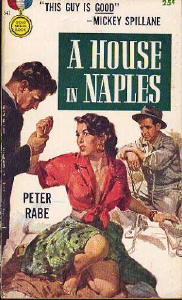Forgotten Books: A House In Naples by Peter Rabe

Forgotten Books: A House In Naples by Peter Rabe
Whenever I read Peter Rabe at his best--or hell, even when he's mediocore--I realize how bogus a lot of hardboiled fiction is. Raymond Chandler likely learned about crime from the pulps and B-movies. As did many pulp writers.
Today we tart things up in a way previous hardboiled writers didn't and that gives it a semblance of reality anyway. Or we parody it and that makes us feel superior to it. Nothing wrong with these approaches, either. They're entertaining, amusing, fun.
Maybe it was because Rabe approached his writing as mainstream instead of genre. While he honors the tropes set down by W.R. Burnett and his imitators Rabe's crime novels are idiosyncratic, sometimes to a fault. In a few books he wanders, gets lost, and it's always because he wants to tell us something fascinating but not germane to the story. I actually enjoy his side trips but they do damage a couple of his books.
A House in Naples is about two people who are pretty much despicable, deserters at the end of the big war who run a black market operation. They aren't much better morally than Graham Greene's Harry Lime. Charley and Joe they are, friends in greed. They are living in Naples and living well. But Charley doesn't have his papers and could get extradited. Uncle Sam is not looking favorably on deserters these days.
As the book opens Charley is wounded and recognized for who and what he is. He ends stealing the papers from a dying drunk and then ends up dragging the body into the Tiber to cover his tracks. But by this time his wound has taken his toll. He is barely concious when he looks up and sees a beautiful girl staring down at him from the bridge above. He falls in love. Rabe gives this unlikely moment an ethereal power that few others could have pulled off. You buy it.
The book is a fast, sure read and the ending is a shocker. But the characters and Rabe's observations on post-war Europe are the source of the book's rich bleakness. The bleakness is very much like the realist filmmakers who appeared in Italy right after the war.
Rabe uses The Girl to contrast Charley and Joe. In some respects she's almost a religious figure, a woman who can evoke good or evil in everyone she meets. She evokes what's in you already.
For some reason A House in Naples isn't mentioned as often as Rabe's other most successful novels. But its harsh poetry and exciting action will keep it in memory long after you're done with it.
Published on January 25, 2012 09:30
No comments have been added yet.
Ed Gorman's Blog
- Ed Gorman's profile
- 118 followers
Ed Gorman isn't a Goodreads Author
(yet),
but they
do have a blog,
so here are some recent posts imported from
their feed.



